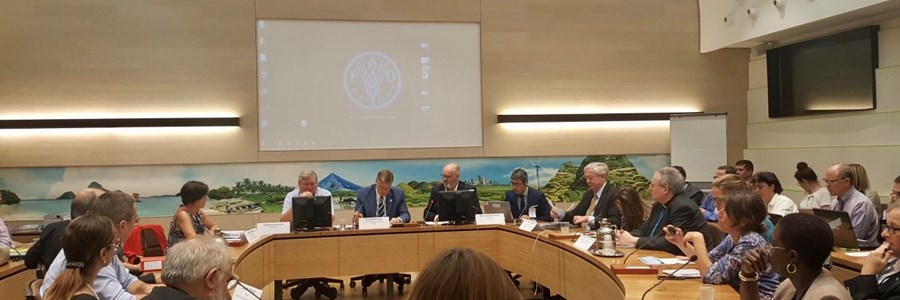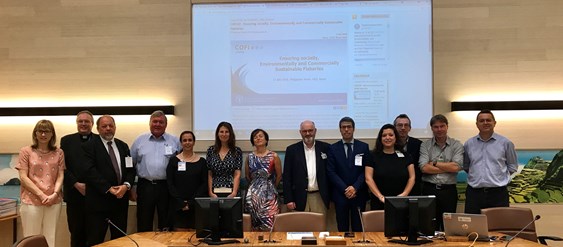European industry, NGOs and UN agencies call for a socially, environmentally and commercially sustainable fisheries

The European Social Partners in the Fisheries Sector were proud to host today together with the Kingdom of the Netherlands, the European Commission and the Holy See, a side-event on the social dimension of fisheries during the 33rd session of the Committee on Fisheries (COFI), a subsidiary body of the Food and Agriculture Organization (FAO). Despite the progress in health and safety operations, insufficient attention has been given by governments to the implementation of essential principles of international law for the protection of fishers, making fishing still a hazardous activity. In order to bridge the gap, participants widely called for the development, in close cooperation with UN agencies, of an effective roadmap for the rapid worldwide implementation of the international agreements relating to work and safety in the fishing sector.
COFI is a forum where global agreements and instruments are at the heart of the discussions, thereby creating the perfect platform to get the message on the social dimension of fisheries across all countries.
Following a brief overview of existing legislation at international and regional level, high-ranked panellists provided advice on how to overcome obstacles and shortcomings to better protect fishers and fight against IUU fishing, which is widely associated with crimes involving the safety and welfare of crews. Key speakers from the fishing industry (employers, trade unions), the civil society (The Pew Charitable Trusts) and international organisations such as FAO, the International Labour Organization (ILO), the International Maritime Organization (IMO) and the Division for Ocean Affairs and the Law of the Sea instruments showed the actions and tools implemented by their organisations to improve and raise awareness on the social dimension of fisheries.

There was a unanimous call towards widespread ratification of the international instruments for safety at sea in fishing and the protection of fishers’ lives. In this sense, Ment van der Zwan, employers’ spokesman in the EU social dialogue committee on sea-fisheries declared: “We urge UN agencies to establish a focus working group to identify what needs to be done, time frames, roles and responsibilities for the various stakeholders. Only through a solid roadmap we will be able to close the gap and better understand how to implement such measures.”
Fleming Smidt, workers’ spokesman in the EU social dialogue committee on sea-fisheries, concluded: “International actors cannot continue working in silos. The cooperation between international bodies, governments and stakeholders is fundamental to make fishing a well-regulated, safe and responsible activity. We therefore invite policy-makers to lay the foundations, and make progress on the social dimension of fisheries to ensure a true level of sustainability at global level.”
Ends
Europêche represents the fisheries sector in Europe. Currently, the Association comprises 10 national organisations of fishing enterprises from the following 8 EU Member States: DE, ES, FR, IT, MT, NL, LV, and PL.
The European Transport Workers’ Federation (ETF) The European Transport Workers’ Federation (ETF) embraces transport trade unions from the European Union, the European Economic Area and Central and Eastern European countries. The ETF represents more than 5 million transport workers from more than 230 transport unions and 42 European countries.
Press contacts:
Daniel Voces, Managing Director of Europêche +32 2 230 48 48 daniel.voces@europeche.org
Livia Spera, ETF Political Secretary +32 470 93 05 89 l.spera@etf-europe.org
Background information
The United Nations Convention on the Law of the Sea (UNCLOS) is very clear towards the obligations of every flag state. They have the duty to ensure their vessels’ safety at sea with regard, inter alia, to (a) the construction, equipment and seaworthiness of ships, (b) the manning of ships, (c) the labour conditions of their crews, and (d) the training of their crews.
The International Maritime Organization (IMO), the International Labour Organization (ILO) and the Food and Agriculture Organization (FAO), all specialized agencies of the United Nations, have indeed developed and adopted international instruments on all four duty areas for fishing.
Particularly, IMO Cape Town Agreement 2012 (safe construction); ILO Work in Fishing C188, 2007 (manning and labour conditions); IMO STCW‐F, 1995 (safety and training); FAO Code of Conduct for Responsible Fisheries and Agreement on Port State Measures (responsible fishing), are the foundations for the protection of fishermen across the world. These Conventions are either not into force or poorly ratified by the international community. The European Union is leading the way by transposing into Community law many of these Conventions.
The aim of this event is to provide practical expert advice to and from international and national policy-makers, industry and NGOs to develop a roadmap towards widespread ratification of the international instruments for safety at sea in fishing, the protection of fishers’ lives and fight against IUU. It will also serve to create awareness on the need to ensure a socially, environmentally and commercially sustainable fisheries; thereby influencing the COFI discussions.
Sources: Europeche
Attachments:
Tags: social partners, Kingdom of the Netherlands, European Commisssion, the Holy See, fao, ILO, IMO, DOALOS, The Pew Charitable Trusts, etf, UNCLOS, Cape Town Agreement, C188